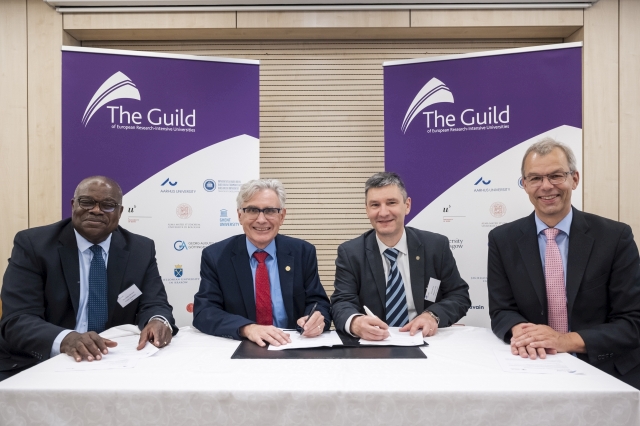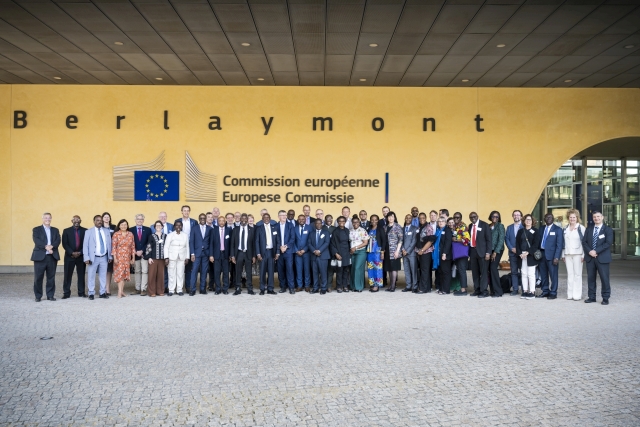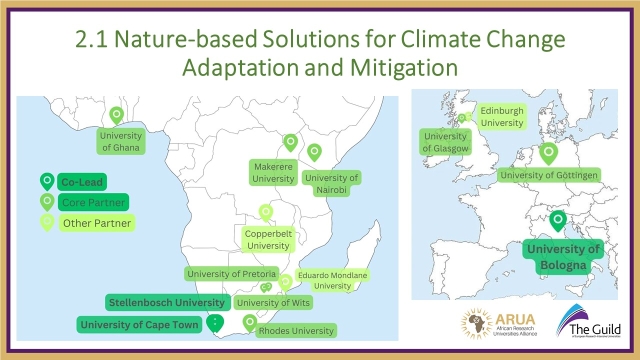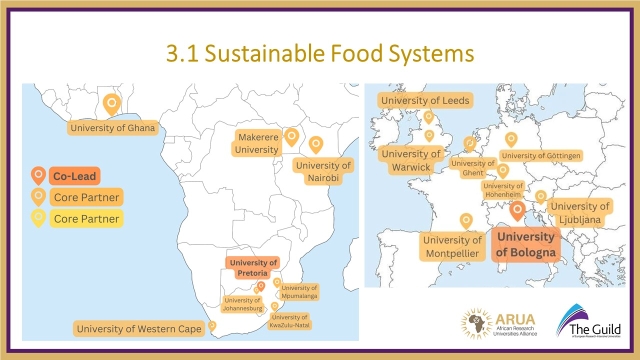Africa and Europe together for scientific research: the University of Bologna is among the key players of the new Clusters of Research Excellence

Signing of the agreement on African-European Clusters of Research Excellence. From the left, Ernest Aryeetey (ARUA secretary general), Wim de Villiers (Rector and Vice Chancellor, Stellenbosch University), Alberto Credi (Pro-rector for Research, University of Bologna), Jan Palmowski (secretary general, The Guild)
European and African universities join forces to tackle the major global challenges of today and tomorrow. The collaboration between the Guild of European Research-Intensive Universities (The Guild) and the African Research Universities Alliance (ARUA) has given rise to the Africa-Europe Clusters of Research Excellence (CoRE): a new model of university partnership that will pave the way for a new era of collaboration between Africa and Europe in the fields of research, innovation, and higher education.
Two of the newly approved Clusters by the joint assembly of The Guild and ARUA will be coordinated by the University of Bologna: Nature-based Solutions for Climate Change Adaptation and Mitigation, together with the University of Cape Town and Stellenbosch University, and Sustainable Food Systems, together with the University of Pretoria.
The joint assembly between The Guild and ARUA that marked the birth of the "African-European Clusters of Research Excellence"
The Africa-Europe Clusters of Research Excellence are based on multilateralism and research excellence: each partnership brings together at least three African universities and two European universities to work on a thematic area of common interest, addressing the major scientific challenges through research and higher education that leverage the skills and excellence of the participating universities. These actions have a long-term perspective, spanning at least a decade, ensuring a balance between the resources and priorities of African and European universities, while focusing on the scientific education of the next generation of researchers.
"Mitigating the effects of climate change and ensuring sustainable and safe food production are globally prioritized issues that can only be addressed through interdisciplinary and international approaches. In this regard, the new Clusters of research excellence represent a game changer in bringing together the strengths of African and European academic institutions and leveraging their expertise and capacities," declares Alberto Credi, Vice Rector for Research at the University of Bologna. "The University of Bologna is taking a further step towards a new approach to academic and scientific cooperation between Africa and Europe, based on sustainability, quality, equity, capacity building and scalability."
The Cluster "Nature-based Solutions for Climate Change Adaptation and Mitigation" is proposed by an interdisciplinary group led by Silvana Di Sabatino, Professor at the Department of Physics and Astronomy "Augusto Righi" of the Alma Mater, together with Professor Mark New from the University of Cape Town and Professor Guy Midgley from Stellenbosch University.
The partnership, which includes 11 partner universities, 8 of which are African (Cape Town, Stellenbosch, Rhodes, Ghana, Witwatersrand, Nairobi, Makerere, Pretoria) and 3 European (Bologna, Göttingen, Glasgow), will establish a hub of climate services for Africa and develop an innovation center to design nature-based solutions capable of helping us mitigate the negative effects of climate change and adapt to it. The Cluster will also promote the creation of doctoral networks and training activities to strengthen collaboration between European and African universities.
The Cluster "Sustainable Food Systems" is proposed by a team of researchers coordinated by Luca Fontanesi, Professor at the Department of Agri-Food Sciences and Technologies of the University of Bologna and Rector’s Delegate for Competitive Research Projects, together with Professor Frans Swanepoel from the University of Pretoria.
The collaboration includes 16 other partner universities, 8 of which are European (Bologna, Warwick, Ghent, Göttingen, Ljubljana, Leeds, Montpellier, Hohenheim) and 8 are African (Pretoria, Nairobi, Ghana, Kwazulu-Natal, Makerere, Western Cape, Johannesburg, Mpumalanga), along with 2 non-academic partners. The Cluster will address the challenges that food production systems will have to face along the transformation towards increasing sustainability. Building on the solid foundations of established partnerships and programs, extensive collaborative research and capacity building are envisaged, with a particular focus on early-career researchers involved in joint projects. The goal is to contribute substantially to the innovation of African and European food systems.






